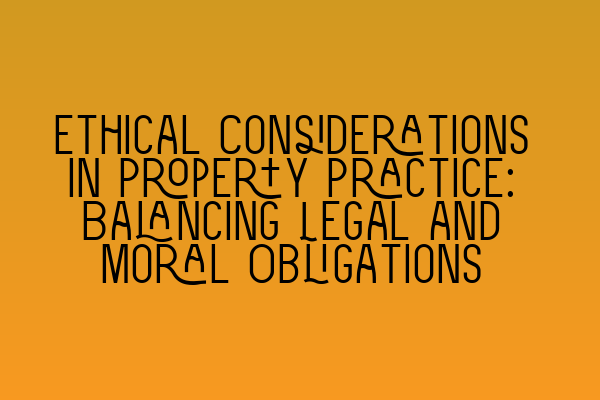Ethical Considerations in Property Practice: Balancing Legal and Moral Obligations
Welcome to the SQE Property Law & Land Law blog! In this article, we will explore the important topic of ethical considerations in property practice and the delicate balance between legal obligations and moral responsibilities.
Property practice involves a wide range of legal issues, from buying and selling properties to leasing and landlord-tenant relationships. As legal professionals, it is crucial for us to not only understand the legal framework surrounding property law but also to consider the ethical implications of our actions.
One of the key ethical concerns in property practice is the duty of honesty and transparency. Clients rely on solicitors to provide accurate information about the properties they are interested in, and any misrepresentation can lead to serious consequences. In our related article on Misrepresentation in Contracts: Unveiling Deceptive Practices, we delve deeper into this topic and discuss various deceptive practices that can occur in property transactions.
Furthermore, a solicitor must strive to protect the interests of their clients while also considering the broader impacts on society. For example, when handling property transactions, it is crucial to consider the environmental impact of the property and any potential harm it may cause to the surrounding community. This aligns with our commitment to sustainability and responsible property practices.
Another ethical consideration is the duty to avoid conflicts of interest. Solicitors must ensure that they act in the best interests of their clients without compromising their integrity or impartiality. In property practice, this often involves careful navigation of relationships with multiple parties involved in a transaction. Understanding landmark cases and influential judicial decisions, as discussed in our article on SQE Contract Law: Analyzing Landmark Cases and Influential Judicial Decisions, can provide valuable insights into how conflicts of interest have been addressed in the past.
Moreover, a solicitor must also consider the impact of their actions on vulnerable or disadvantaged individuals. They have a duty to respect the rights and dignity of all parties involved, particularly in situations where power imbalances may exist. Understanding contractual capacity, as explained in our article on Understanding Contractual Capacity: Rights and Limitations, can help solicitors navigate these sensitive issues.
As SEO experts at SQE Property Law & Land Law, we understand the importance of providing valuable and up-to-date information to our readers. We offer interactive SQE mock tests for contract law, allowing you to test your knowledge and enhance your understanding of property law. To access these tests, visit our article on Interactive SQE Mock Tests for Contract Law: Test Your Knowledge.
If you want to dive deeper into the ethical considerations in property practice, we invite you to join our SQE Contract Law webinars. Our expert presenters provide insights and guidance on various legal topics, including ethical dilemmas in property law. To learn more about our webinars, visit our article on Join Our SQE Contract Law Webinars: Expert Insights and Guidance.
In conclusion, ethical considerations are crucial in property practice. Balancing legal obligations and moral responsibilities is not always easy, but as legal professionals, we must remain committed to upholding the highest ethical standards. By staying informed and engaging in continuous professional development, we can navigate the complexities of property practice while prioritizing the interests of our clients and society as a whole.
